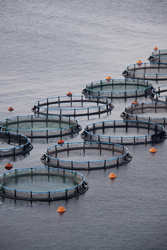Designing more environmentally sustainable fish farms
Aquaculture is one of very few industries experiencing growth in these difficult financial times. Care must be taken to ensure that it doesn't outgrow its welcome as environmental impacts such as red tides and eutrophication continue to damage its reputation. Aquaculture is inexorably tied to water quality, yet little is known about this complex relationship. EU funding was allocated to investigate this aspect in the context of the 'Water quality and sustainable aquaculture: links and implications' (Aquas) project. The give-and-take relationship between aquaculture and water quality was studied at three sites where different types of fish and shellfish are farmed. Not only were water and sediment samples analysed for a number of parameters, but weather, wave and financial data were also collected. Extensive assessment of the data, including numerical simulations, led to a number of important recommendations for sustainable aquaculture. For example, species density should be minimised in order to avoid disease and thereby eliminate the need to introduce antibiotics to the system. Overfeeding is another common mistake. Better food management can not only prevent unnecessary nutrient accumulation in the vicinity of the fish farms, it can also save the fish farmers' money. In terms of guidance for the future, legislation at the regional, national and international levels could also be better aligned. In addition, while environmental surveillance programs (ESPs) may already be in place in some regions, they could be better coordinated with respect to harmonised data collection and their geographical coverage extended. Efforts to improve water quality not only benefit the environment and the local ecosystem, they also help improve the productivity of actual fish farms.







